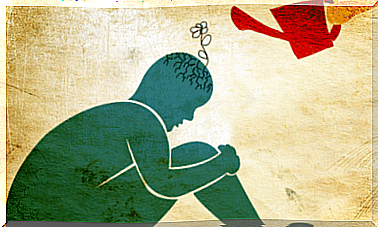Why It Does Not Always Work With Positive Thinking

Many have realized that positive thinking does not always work and that a hopeful attitude does not guarantee that good things will happen. Some experts believe that it can lead to us humans having a tendency to enter a period where we adopt some form of “mild pessimism”, which helps us understand that life sometimes does not go our way.
This is not necessarily a bad thing. The human mind is used to extreme polarity, which explains why we feel the need to categorize things as “good” or “bad”. But it may be time to understand that not everything is black or white.
For many decades, positive thinking has been a recurring theme. After all, this is what we tend to stick to when we face difficulties. It is no secret that if we somehow manage to inject optimism into the brain, it prevents us from falling into the abyss of helplessness.
But the present is full of uncertainty. In one way or another, it is necessary to face the fear we have, no matter how difficult it may be.
In addition, it is time for us to start seeing things from a different perspective, one where positivity and hope still exist, but in a more realistic way. This would undoubtedly make it easier for many to navigate challenges more efficiently.
Why positive thinking does not always work
Positive thinking has many defenders but also many opponents. It can be said that there is no compromise alternative in this regard. To the psychological approach popularized in the 1990s by individuals such as Martin Seligman and Mihály Csíkszentmihályi, critical voices are added, such as those of psychologist Julie K. Norem, a professor of psychology at Wellesley College. Believe it or not, she has for a long time tried to warn everyone about something like what has now become increasingly clear.
In her book from 2001, The Positive Power of Negative Thinking , she talks about the childish way in which our culture views positivity. There has been a significant simplification of Seligman’s lessons, to the point where individuals see positivity as something “fashionable”. In fact, many assume that everything can be fixed by focusing on the bright side of life.
But let’s be honest here. Sometimes it is impossible to focus on the bright side of life. This is not only understandable but natural. As Viktor Frankl pointed out, it is normal to react in an unusual way in unusual situations. Therefore, it is important to understand that there are many different reasons why positive thinking does not always work. Let’s analyze them in more detail.

Positive thinking does not prepare you to face negative results
Repeating that “everything will be okay” over and over again can be counterproductive. There is a risk of just focusing on a successful outcome that ignores other opportunities. That way, if things do not go as you wish, it can take you by surprise, both emotionally and psychologically.
The best thing you can do in these situations is to use a realistic strategy. ” I hope things go well, but if they do not, I will deal with the problems immediately. I will accept it and deal with it appropriately. ”
It can make you adopt a passive attitude
Julie K. Norem explains in her book that it is advisable to adopt a somewhat pessimistic perspective on reality. It’s about mixing all the possibilities and reminding yourself of what you want and hope will happen, but also realizing that there is a possibility that things will go wrong. It is important that you think about what you would do in these circumstances.
You need to do your best and work hard to prevent these negative results from occurring. If you simply assume that everything will work, you will probably adopt a passive attitude, which can be dangerous.
Positive thinking does not always work in the face of anxiety
The anxious mind has the property of not being able to see the good side of life. In that sense, it does not always work to think positively when you feel anxious, stressed and emotionally challenged. There are situations where, no matter how much others say you should pull yourself up, you still feel down because you simply do not believe it.
In this context, it is interesting to consider the approaches that acceptance and engagement therapy (ACT) offers. These can help you understand that life is not easy and that you have permission to fall, be fallible and sometimes feel hopeless. However, this does not mean that you will lose your commitment to yourself. It is important to find a balance simply.

Extreme is never good: get rid of naive positivism along with chronic pessimism
Positive thinking does not always work because life is unpredictable. But also because your coping strategies against adversity, frustration, fear and suffering may not be enough.
Life is a kaleidoscope of experiences. Sometimes they are good, sometimes they are bad and other times they are just average. You must learn to navigate all these seas both on calm days and stormy nights.
Does that mean it’s better to be pessimistic? Not at all. However, it is not advisable to assume a naive and unwavering positivity. You must not think that it is enough to want something for it to happen. The moments that are going on right now can be quite complicated and you have probably already realized that this formula does not work. Extremes are never good.
You have to be realistic. Train yourself to deal with daily challenges and learn to tolerate the unpredictable, or even the painful. Keep in mind, however, that everything is about a balance, which means that you should continue to nurture hope. After all, it is an existential necessity.









